RJ Market Watch
Agile leadership: What kept the boat flowing?
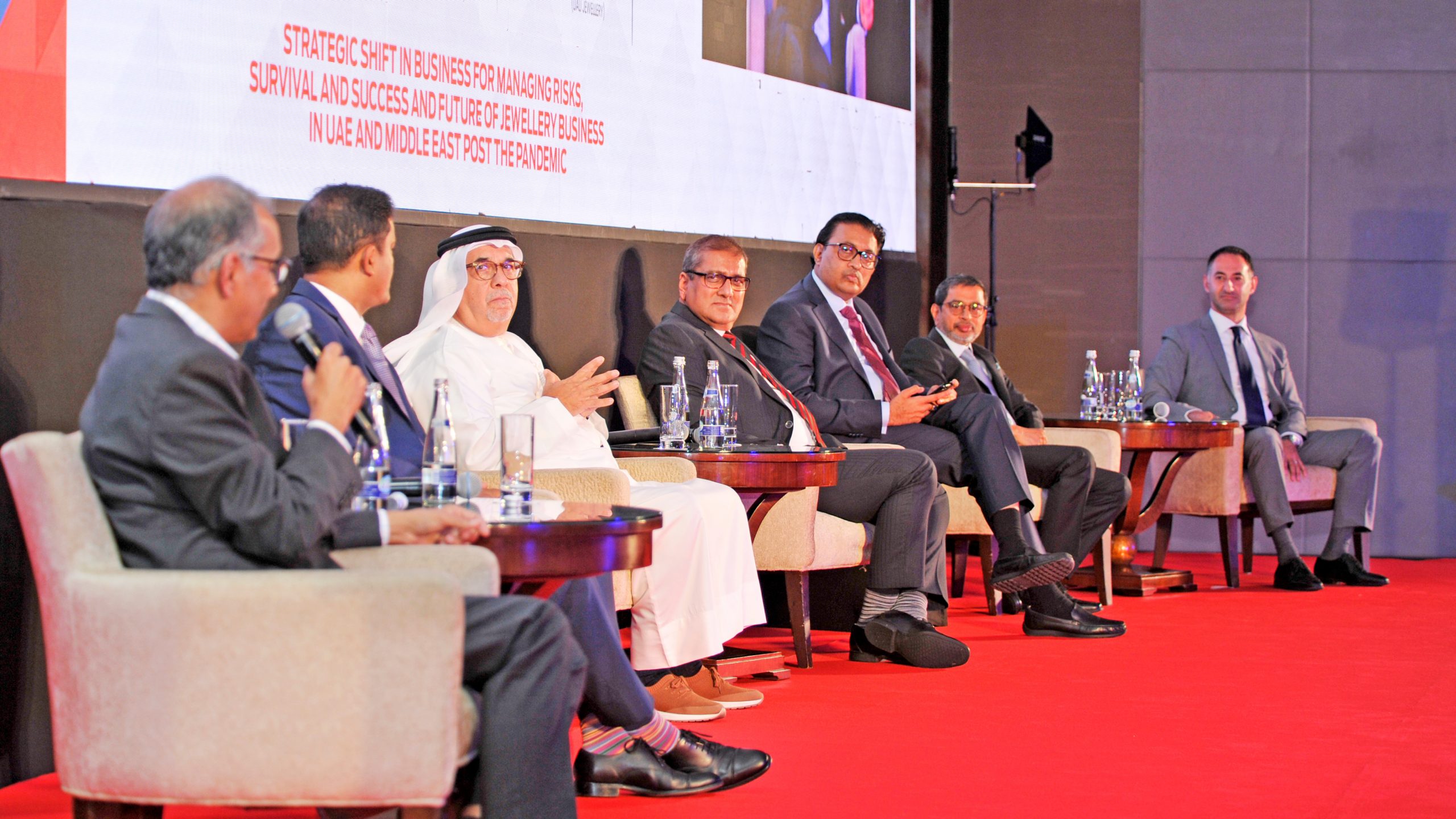
The headline panel of the Retail Jeweller World Dubai Forum concentrated on the way ahead for the jewellery industry in the region after the shock of the pandemic starts to finally wear off
A final session. A final word. But the best of them all.
The Retail Jeweller World Dubai Forum, which saw 149 delegates from UAE, Bahrain, Saudi Arabia, Kuwait and Jordan, had a flurry of networking, constructive barter of ideas and bright faces of jewellers and industry leader meeting each other physically after a year of staying behind the trope of computer screens and telephonic conversations.
Amid all the informative discussions that happened throughout the day, the last one, the headline panel, was what everyone was waiting for. It had the biggest names, the most influential and successful leaders who have been showing the jewellery industry in the Middle East its way for a long time now. Moderated by Amit Dhamani, group CEO of Dhamani 1969, the panel was called “Agile Leadership: Strategic Shift in Business for Managing Risks, Survival and Success and Future of Jewellery Business in UAE and Middle East Post the Pandemic”. The panellists were twinkling stars of the industry — Dev Shetty, president and CEO of Fura Gems, Tawhid Abdulla, CEO of Jawhara Jewellery, Chandraprakash Siroya, director of Siroya Jewellers, K P Abdul Salam, the group executive director of Malabar Gold & Diamonds, Anuraag Sinha, the managing director of Liali Jewellery, and Antoine Masse, group general manager of Mouawad.
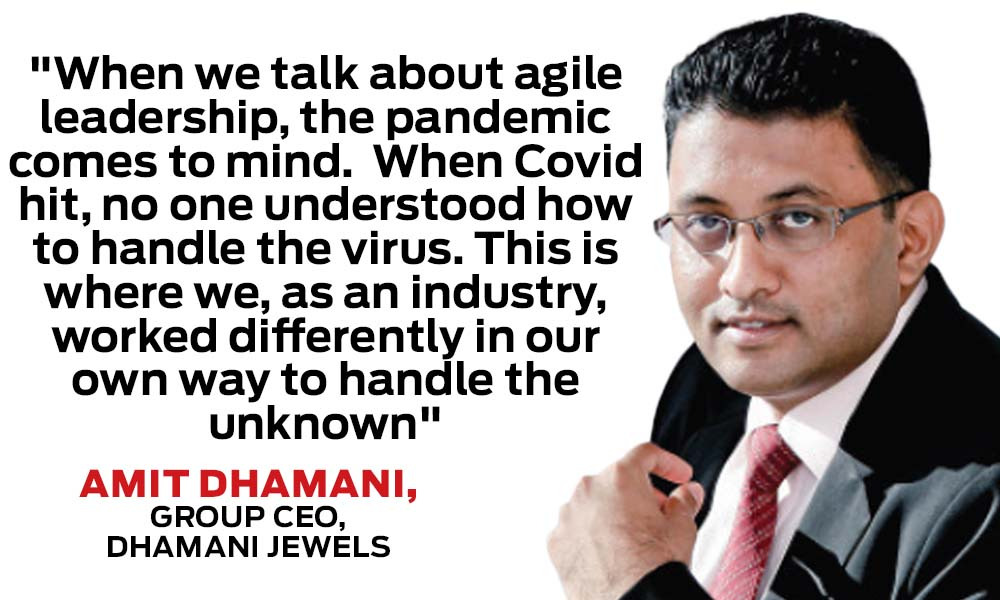
Dhamani kicked off the panel discussion with glowing introduction to the humble people who were waiting to brainstorm and share their insights on stage. “When we talk about agile leadership, the pandemic comes to mind. When Covid hit, no one understood how to handle the virus. This is where we, as an industry, worked differently in our own way to handle the unknown. How these leaders handled their products, their location, their price and promotions in these unprecedented times without hurting the brand and employees is what will be up for talks today,” he said.
The first question thrown to the floor was, “What actions did you take that reflects your out-of-the-box thinking?
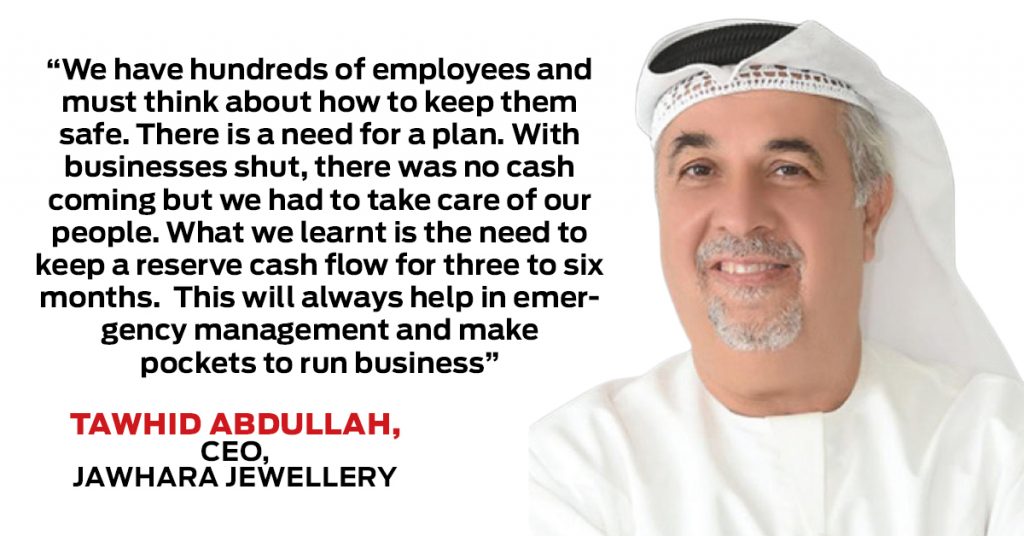
Abdullah recalled how the pandemic is something that no one in three generations of his business had ever seen. “We have hundreds of employees and must think about how to keep them safe. There is a need for a plan. With businesses shut, there was no cash coming but we had to take care of our people. What we learnt is the need to keep a reserve cash flow for three to six months. This will always help in emergency management and make pockets to run business,” he said.
The stalwart went on to talk about how the industry must deal with their retail space. “Ninety-five percent of our money is in inventory and we need to convert that. People in our industry are not tech-savvy so we had no channels. We powered on with the help of the Dubai government, which took good care of us. But, unless we start looking at what we want to do, it will be difficult. During the month-long lockdown, we took stock of our inventory and had webinars to take decisions,” he said.
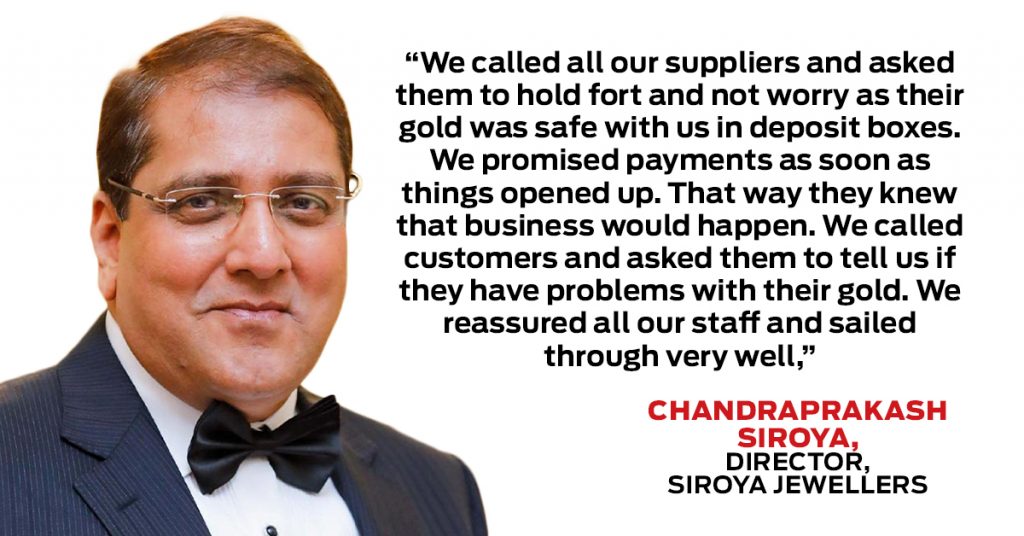
Siroya was all about reassurances during hard times. “We called all our suppliers and asked them to hold fort and not worry as their gold was safe with us in deposit boxes. We promised payments as soon as things opened up. That way they knew that business would happen. We called customers and asked them to tell us if they have problems with their gold. We reassured all our staff and sailed through very well. Today, the customers and suppliers are happy. Bankers are also happy as we are almost at zero debt now. It has been a fantastic learning. Our takeaway from the pandemic was, the more you can sell in cash, the better it is. Give credit to the level where you can sustain a loss,” he said.
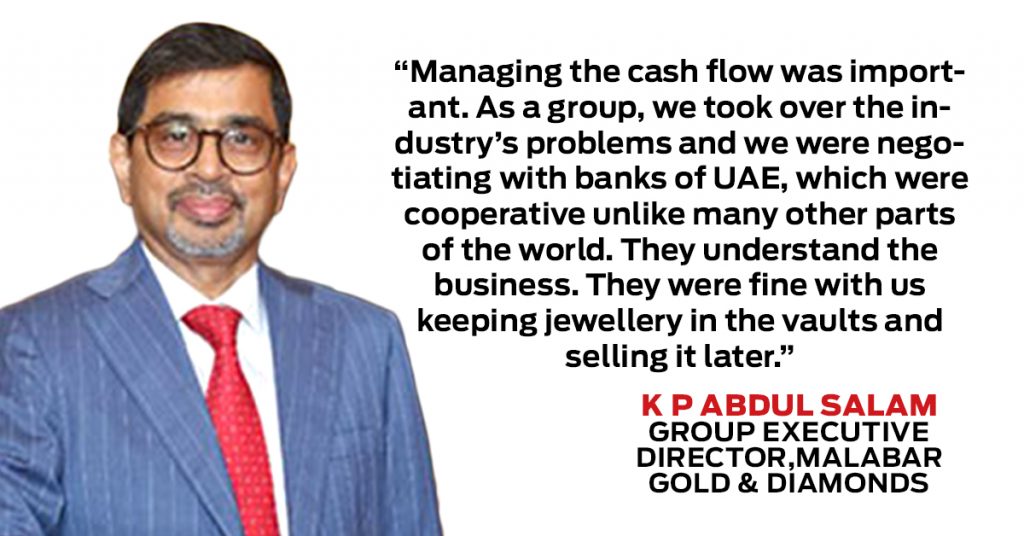
For KP Abdul Salam, the biggest jewellery company in the world that he heads, also had its fair share of issues. “We were not sure what to do. In one of our first webinars, I had said that the immediate step we had to take was for our 2,500 employees. Many were in a confused state and wanted to go back home so we arranged for chartered flights to India for them. We assured them that we will call them back when things become normal and we will take care of their requirements back home. Managing the cash flow was important. As a group, we took over the industry’s problems and we were negotiating with banks of UAE, which were cooperative unlike many other parts of the world. They understand the business. They were fine with us keeping jewellery in the vaults and selling it later. We talked to our partners, real-estate owners and landlords over retail spaces. It was a collective effort, but what we must keep in mind is that these situations will keep hitting us with curveballs. So it is important to work with good people who understand you,” he said.

Masse also impressed on the need to have more cash available. “Who are our future clients? Being agile is not only managing cash but making sure it keeps flowing in. We have to ensure the future generations are interested in jewellery. The future is agility by being tech-savvy. Saudi leads when it comes to digital marketing. A Forbes study shows that there is a new billionaire every 17 hours. This is great news for us. We should also cater to independent and strong women. Technology is the way ahead,” he said.
For Sinha, the line of success lay in the word “empathy”. “Let us understand our people. During the 30 days of lockdown in UAE and 2 months in other countries, we all conducted online training at a cross company level. This was not to train people as much as it was about being supportive and keeping connected. Sales were happening in good measure later but technology is the only constant that will keep impacting us and forcing us to adapt,” he said.
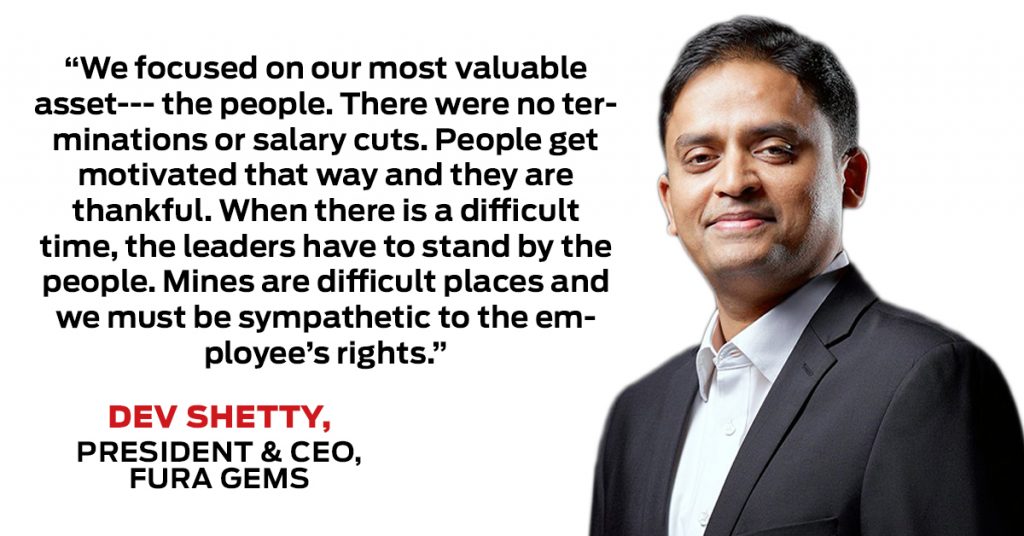
Shetty spoke about how the 6-month shutdown in Colombia, 4-month lockdown in Mozambique and the embargo on flying to Australia impacted his mining operations. “We focused on our most valuable asset— the people. There were no terminations or salary cuts. People get motivated that way and they are thankful. When there is a difficult time, the leaders have to stand by the people. Mines are difficult places and we must be sympathetic to the employee’s rights. As a mining co, we focus on stability and keep a contingency plan in place. Once that happens, we can talk about growth,” he said.
Dhamani’s second question was, “If you were to look into a crystal glass, how do you see the future of the gem and jewellery industry a decade from now?”
For Abdullah, it was management that was going to be key. “It is never a one-man show. Decisions have to be taken collectively. There should be a budget for marketing, with proper focus on technology. We are emphasising on the future of inventory financing, blockchain and technology. Allot old inventory a set berth and allocate them time. Planning is very important,” he said.
Siroya said that the future of the industry is bright. “As long as there are women, the demand for jewellery will be high. Its about how we will take care of the future. We are dream merchants. When we sell a unique piece, we make a person dream. We should relook the way we price our products. We should give more value to the customer. Brand value is important and one must come above selling generic jewellery,” he said.
“This is an industry that survived a lot of things. The future is good. As a jewellery business, we should take a good look at inventory. We have the habit of stocking up, the situation is changing as buying habits are changing too. The pandemic has shown the world the power of e-commerce in the industry. There will be a combination of online and the traditional store,” said Salam.
While Masse stressed on the importance of revamping and melting old pieces even though they have sentimental value, Sinha said that there was a need to build brands and tell stories to sell and make profits.
In the end, Shetty praised the UAE government for its Vision Document for 2021. “A country of 10 million targets a population of 2 billion in tourists for opportunities — that is when you know that there are great things in store for the industry.”
Courtesy: Retail Jeweller World News


















You must be logged in to post a comment Login